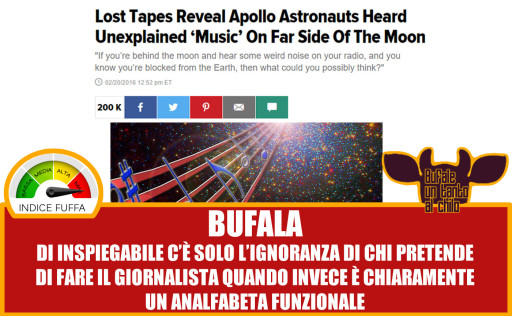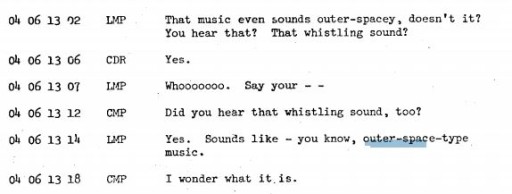La musica della Luna sull’Apollo 10

In quello che in realtà non è altro che un super spottone di una serie TV che si chiama NASA’s Unexplained Files, l’Huffington post americano il 20 febbraio ci racconta di questo mistero. Come per Ancient Aliens, per creare una parvenza di credibilità bisogna dire qualche bugia. Poi se si mettono delle musiche angoscianti e uno speaker col vocione, il gioco è fatto. Qui i due spezzoni della puntata.
Parte prima:
Parte seconda:
Un riassunto per chi non volesse guardarli:
It was 1969, two months before Apollo 11’s historic first manned landing on the moon, when Apollo 10 entered lunar orbit, which included traversing the far side of the moon when all spacecraft are out of radio contact with Earth for about an hour and nobody on Earth can see or hear them.
As far as the public knew, everything about the mission went smoothly.
Almost four decades went by before lost recordings emerged that revealed something unsettling that the three Apollo astronauts had experienced while flying above the far side of the moon.
The taped recordings contained “strange, otherworldly music coming through the Apollo module’s radio,” according to the upcoming Science Channel series, “NASA’s Unexplained Files.”
The conversation between the three astronauts indicated they heard sounds like they had never heard before:
“It sounds like, you know, outer space-type music.”
“You hear that? That whistling sound? Whooooooooo!”
“Well, that sure is weird music!”
Brevemente: gli astronauti della missione Apollo 10 – missione di “prove generali” per il primo allunaggio che avrebbe avuto luogo nella missione successiva – durante l’ora di “silenzio radio”, cioè quando si sarebbero trovati sula faccia nascosta della Luna, hanno avvertito nella radio di bordo dei disturbi, una serie di rumori che ha sorpreso gli astronauti.
“Sembra una musica tipo spaziale”
“Lo senti? È come un fischio. Whoooooooooo!
“Bhe, è senza dubbio una musica strana!”
Per far sì che questa storia diventi interessante ovviamente servono 2 cose:
- mentire inventandosi la storia che fu tutto insabbiato
- inventarsi che la spiegazione della NASA non fosse sufficiente
Infatti:
The transcripts of the Apollo 10 mission were classified and untouched in NASA’s archives until 2008, producing an ongoing debate as to the nature and origin of the strange sounds heard by the astronauts.
“You don’t hear about anything like that until years after the incident occurs, and then you kind of wonder, because it’s such an old memory of those things that you get concerned about if they were making something up or was there something really there? Because you never really know,” Worden told The Huffington Post.
Leggenda vuole che fino al 2008 nessuno avesse mai avuto accesso alla trascrizione delle comunicazione o alle registrazioni di queste: FALSO. Come informa la NASA dal loro profilo Tumblr:
While listed as ‘confidential’ in 1969 at the height of the Space Race, Apollo 10 mission transcripts and audio have been publicly available since 1973. Since the Internet did not exist in the Apollo era, we have only recently provided digital files for some of those earlier missions. The Apollo 10 audio clips were uploaded in 2012, but the mission’s audio recordings have been available at the National Archives since the early 1970s.
Le comunicazioni quindi furono catalogate come riservate fino al 1973 e all’incirca nello stesso periodo vennero rese disponibili anche le registrazioni. Internet non esisteva, quindi chi voleva ascoltare le registrazioni o leggere la trascrizione doveva semplicemente chiedere di poter accedere agli archivi della NASA, e non era una cosa così complicata. La NASA era ed è ancora un ente pubblico, e il materiale non segretato è accessibile ad ogni cittadino americano. Se volete ascoltarvi il pezzo “incriminato” eccolo qui:
E questa è la trascrizione della missione:
Apollo 10 Lunar orbit transcripts
La prima cosa che mi sono chiesto leggendo questa storia è stata “Ma gli astronauti delle missioni successive non l’hanno sentito?” In realtà sì e non è stato in nessun modo censurato. Michael Collins, il terzo astronauta della missione Apollo 11, quello che rimase nel modulo orbitante, lo scrive nel suo libro pubblicato nel 1974, Carrying the Fire:
There is a strange noise in my headset now, an eerie woo-woo sound. Had I not been warned about it, it would have scared the hell out of me. Stafford’s Apollo 10 crew had first heard it, during their practice rendezvous around the Moon. Alone on the back side, they were more than a little surprised to hear a noise that John Young in the Command Module and Stafford in the LM each denied making. They gingerly mentioned it in their debriefing sessions, but fortunately the radio technicians (rather than the UFO fans) had a ready explanation for it: it was interference between the LM’s and Command Module’s VHF radios. We heard it yesterday when we turned our VHF radios on after separating the two vehicles, and Neil said that it ‘sounds like wind whipping around the trees.’ It stopped as soon as the LM got on the ground, and started up again just a short time ago. A strange noise in a strange place.
Quindi non era un segreto proprio ben nascosto. Collins sa che anche l’equipaggio dell’Apollo 10 aveva avuto un’esperienza simile. La spiegazione della NASA è stata semplice: era un’interferenza tra la radio del modulo orbitante e quella del lander. Attenzione a un dettaglio:
We heard it yesterday when we turned our VHF radios on after separating the two vehicles, and Neil said that it ‘sounds like wind whipping around the trees.’ It stopped as soon as the LM got on the ground, and started up again just a short time ago
Il rumore – definito da Armstrong come il vento che fischia tra gli alberi – inizia nel momento in cui i due moduli si separano e smette quanto il lander è lontano e atterrato. Collins non fa riferimento ad esperienze dell’Apollo 8, da qui anche la sorpresa dei membri dell’Apollo 10 che non erano a conoscenza di questo “fenomeno”. Questo perché nella missione Apollo 8 non c’è stato il distaccamento del modulo di atterraggio, quindi non si è potuta verificare la circostanza che porta alla interferenza.


Anche sull’Apollo 10 le interferenze si sentono quanto i due moduli sono separati, come per l’Apollo 11. La NASA aggiunge anche l’opinione di uno dei diretti interessati di quella missione:
As for the likely source of the sounds, Apollo 10 Lunar Module Pilot Gene Cernan told us on Monday, ‘I don’t remember that incident exciting me enough to take it seriously. It was probably just radio interference. Had we thought it was something other than that we would have briefed everyone after the flight. We never gave it another thought.’
Per aumentare l’audience si gioca sul termine “music” usato degli astronauti. In entrambe le missioni lo definiscono nel dettaglio come un fischio – “whistling sound” o “wind whipping around the trees”- quindi non proprio una musica nel senso stretto. Nella trasmissione non viene ipotizzata esplicitamente una fonte “aliena” di questo suono, ma giocare così con un’interferenza non è proprio un modo onesto di porre questi “misteri irrisolti della NASA”.
Inutile dire che questa bufalina gira da anni e anni e ogni tanto qualcuno la deve tirare fuori dal cilindro. Il lato positivo di queste storie esagerate è che diventano un modo per imparare qualcosa di nuovo.
Ricordatevi di amare col cuore, ma per tutto il resto di usare la testa.
neilperri @ butac.it
Se ti è piaciuto l’articolo, sostienici su Patreon o su PayPal! Può bastare anche il costo di un caffè!







